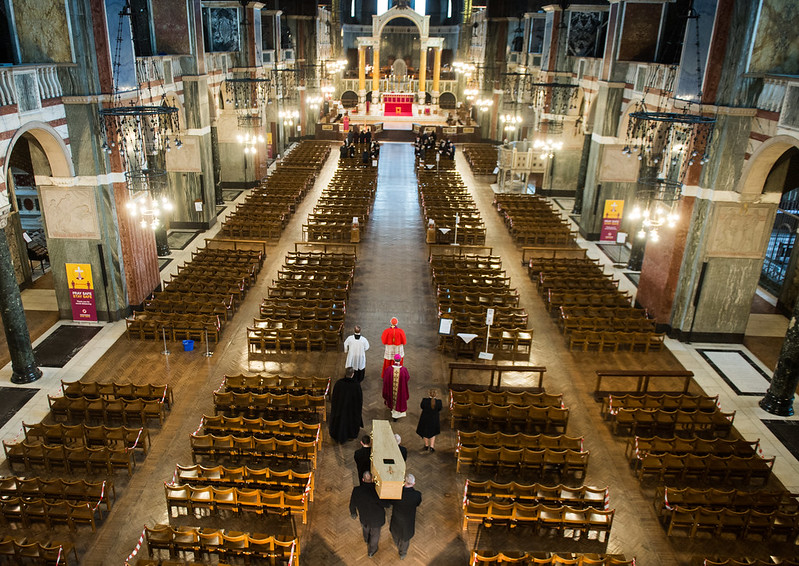Should theologians be worried?
Funding in academia is being squeezed and the numbers applying to study theology and religious studies are in decline. It’s not surprising that academics are fighting amongst themselves over scarce resources. But the recent intervention by the British Association for the Study of Religions (BASR) is one of the most egregious examples of the genre I’ve ever witnessed.
For those unfamiliar with theology and religious studies, although they are two separate academic disciplines, they almost always exist in shared departments; lecturers share drinks after work, students attend courses in both disciplines, and most undergraduates are probably only hazily aware of the distinction between them. The BASR report – a response to the 2019 British Academy Report Theology and Religious Studies Provision in UK Higher Education – places on the rather slender shoulders of a few more than 600 religious studies students the claim that while enrolment in theology and religious studies courses is declining, the rate of decline in religious studies single and join honours has been smaller than that of theology or theology and religious studies, and has actually been slowing.
Just under 32 per cent fewer students signed on to theology and theology and religious studies courses in 2018 than in 2012 versus just under 20 fewer students signing onto religious studies courses in the same period. However, if we take just single honours we see a 35 per cent decrease in theology and theology and religious studies courses, and a near identical 35 per cent decrease in religious studies single honours. A recent surge in dual honours in religious studies seems to be at the root of the favourable statistics for the discipline.
But if we look instead at where the numbers were in 2015/16 we get a very different result. In that academic year religious studies numbers were down 30 per cent overall and joint honours had tumbled down to 36 per cent of the 2012 total. By comparison overall theology and theology and religious studies numbers had declined by only 25 per cent in the same period. The entire claim of the report, that religious studies is performing better than theology, does not reflect six years of data, but just two academic years which saw an additional 121 students take up joint honours religious studies courses (and saw 46 fewer students taking up single honours religious studies).
It is easy to produce grandiose claims when dealing with small numbers in which even a modest addition can cause apparently dramatic swings. We have no idea based on the report’s own data and analysis why there has been such a shift over those two years, nor any idea as to whether it will continue or be reversed. The combination of a high level of abstraction and generality in the report with a lack of granular analysis of particular courses and institutions makes it both of limited use for those in academia trying to improve the situation of theology and religious studies, and risks creating an inaccurate picture of the situation. Where are the case studies? Where was the consultation with relevant departmental heads?
For most of those working in the discipline of theology, there is a danger that the report will come across as needlessly adversarial and over-critical of their field. Far from improving the standing of religious studies, an important and diverse area of study, it could risk producing antagonism between colleagues. The primary author of the report, David Robertson, a lecturer in religious studies at the Open University, believes that there is enough in its slender findings to justify the reallocation of funding and job posts from theology to religious studies.
The head of the body that commissioned the report, and one of the authors of it, Professor Bettina Schmidt, is also deputy chair of a panel that assesses the research output of every theology and religious studies department in the United Kingdom and helps allocate funding accordingly. How can academic theologians be sure of the objectivity of a person who is the co-author of a report that calls for their field to be downgraded relative to religious studies?
How far is the association’s report representative of religious studies as a whole, and those who work in it? Like most theology students I had the advantage of talented and engaged teachers in religious studies who helped widen the breadth of my education. Many in religious studies teach about faith traditions other than Christianity, including Islam, Judaism and Hinduism. They might be surprised to hear that “metaphysical claims are not the subject of religious studies”, as the report suggests. The British Association for the Study of Religions itself draws one third of its membership from outside theology and religious studies departments, and I wonder how far the report reflects the views of the majority of those working in religious studies, many of whom are quite happy to be “entangled” with theology.
It is ironic that the academic disciplines of theology and religious studies face an uncertain future at time when the understanding of religion has never been more vital or more under threat. Decisions about their future must be made within universities and faculties, after wide and thorough consultation that is grounded in firm statistical evidence.



 Loading ...
Loading ...
What do you think?
You can post as a subscriber user ...
User comments (0)